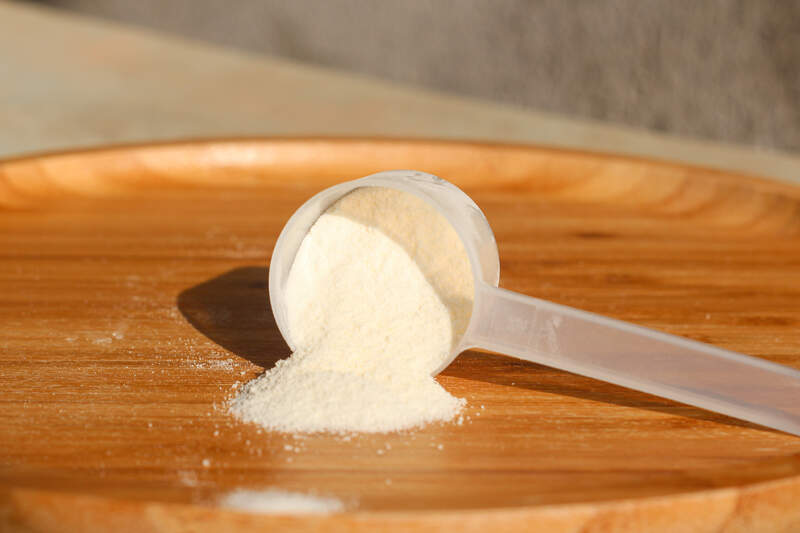What is collagen, and do I need it?
Collagen is a popular health supplement, and for good reason. Let's break down what exactly collagen is, what it does in the body, and whether or not it may be a good idea for you to add more to your diet.

What exactly is collagen and what does it do:
Collagen is the most abundant protein in the human body, acting as a building block for our bones, teeth, muscles, skin, joints, blood vessels, and connective tissues as well as our digestive system. There are actually many different types of collagen, but for the purposes of this article, types I, II, and III form the majority of the collagen in your body. Types I and III provide structure to the skin, muscles and ligaments, while type II is found in cartilage and the eye. Collagen gives our skin, hair, and other tissues its strength and elasticity – and our collagen production goes down as we age, which is one of the reasons our skin starts to look less plump and firm when we get older.
In short, collagen helps keep our joints moving painlessly, our digestive system functioning, and keeps us looking our best.
What exactly is a collagen supplement?
You've probably seen packaging with terms like “collagen peptides,” “hydrolyzed collagen,” or “collagen protein.” These are all different names for collagen powder, which is usually made from collagen-rich beef hide or fish scales through a process called hydrolysis which breaks it down into peptides which our body can absorb. This process ensures the product is pure and free of any contamination, as well as flavorless, easily mixable, and digestible. You can learn more about the collagen protein production process here.
You may also see the words gelatin and collagen used interchangeably, and they are basically the same thing, just in slightly different forms: think ice and water. Gelatin, a form of collagen made by boiling animal bones, cartilage, and skin and then allowing the liquid to cool, has a jiggly, gel-like texture when it's dissolved in hot liquid and then cooled. That's why it's used to make desserts like pudding or gummies, and why the top of your home made bone broth may contain a layer of Jello-like substance once it's cooled; that's the gelatin from the bones. We add extra beef gelatin to True Primal soups as a healthier, more delicious thickener – many canned soups use wheat or other grains or even sweeteners to improve the taste and texture of their product, but we think bone broth and rich gelatin makes for superior flavor.
Collagen is often referred to as a “complex protein,” which is not surprising considering it contains 19 different amino acids. These include a mix of both essential amino acids (ones that cannot be created by the body, so we must get them from outside sources like food) and non-essential, or conditional types (which we can make in the body, but are still useful to ingest, especially during times of stress, injury, or sickness we may need extra outside help). Collagen is a particularly great way to get more conditional amino acids like arginine (which can improve circulation and strengthen the immune system); glutamine (can improve immune system, mood, and digestive function); glycine (assists with cell function and promotes muscle growth); and proline (supports joint health among other benefits).
Do I have to supplement with collagen?
Not necessarily. Collagen and its component amino acids are abundant in many animal foods, including bone broth, fish, chicken, and pork skin, non-muscle meat like tendon, tripe, and oxtail, and even egg yolk. If you eat skin-on chicken and fish, drink bone broth, and eat plenty of eggs, you're probably getting a good amount of collagen. If you don't (or if you eat a more plant-based diet) supplementing with a collagen peptide powder may be beneficial. Additionally, if you are experiencing poor digestion or joint pain, adding more collagen to your diet could help.
Bonus tip: vitamin C supports collagen synthesis in the body, which is how we make our collagen protein for use throughout our bodies. Make sure you're getting enough vitamin C with foods like berries, citrus, and vegetables like Brussels sprouts, spinach, and broccoli.
What are some ways I can incorporate collagen into my daily eating plan?
Most collagen peptide products are flavorless and mix into liquid, so they're easy to add to a protein shake or smoothie, your coffee, or even into soups or oatmeal.
You can also make your own bone broth at home with leftover bones, spices, and vegetables – it's super easy to do in a slow cooker, and you can drink it on its own or add it to soups, stews, rice, or other meals to add nutrients and depth of flavor.
References: